Notable events
In three of the four regions, the number one seed in the region advanced to the Final Four. In the Chattanooga Regional, 13th seeded Liberty upset both Penn State and DePaul to advance to the regional semifinal, but there encountered the top seed LSU, who won and went on to defeat Duke to advance to the Final Four in Indianapolis.
In the Philadelphia Regional, Tennessee faced Purdue in the second round. The victory represented the 880th win for coach Pat Summitt, moving her beyond Dean Smith 879 career victories, to claim the top spot in college basketball career victories. [1] Rutgers upset Ohio State to advance to the regional final, but top seeded Tennessee won to advance. In the Kansas City Regional, top seeded Michigan State defeated the 2 seed Stanford to advance. The single exception was in the Tempe Regional, where second seeded Baylor upset North Carolina to earn a spot at the Final Four.
In one semifinal, Baylor faced LSU. Five years earlier, Baylor had won just seven games against twenty losses, and had never been to an NCAA Tournament. Then they hired Kim Mulkey, who coached the team to an NCAA berth in her first year, and now was coaching a team in the Final Four. However, thirteen minutes into the game, LSU led 24–9. The two teams had played before, in the opening regular season game for Baylor. In that game the Lady Bears found themselves down by 19 points at halftime. They almost closed the gap, but ended up with a one-point loss. This time, they found themselves down again by a large margin. Mulkey called a timeout, and the team responded with six straight points. Not long after, a three-pointer cut the lead to six, and they continued to chip away, reaching the halftime with the score tied at 28. After the break, LSU retook the lead, and were up by four points with just over eight minutes to play, but would go scoreless for five minutes. Baylor retook the lead, and held on to win 68–57 to advance to the championship game. [2]
In the second semifinal, Tennessee faced Michigan State, who were playing in their first Final Four. The Lady Vols had a six-point lead at halftime, but extended the lead to 16 points with fourteen and a half minutes to go. Although the crowd had watched Baylor recover from a 15-point deficit earlier in the evening, that had occurred with 28 minutes to play. This time, the deficit was 16 and just over 14 minutes left. The Spartans cut into the lead, and with a minute to go had tied the game. At that point Kristin Haynie, who had only scored two points in the game, stole the ball and ran almost the length of the floor to score a layup and take the lead. Tennessee then missed three shots and Michigan State scored the final points of the game to tie the record for the largest comeback in NCAA Tournament history. [3] [4]
The final matched up two nontraditional names in women's basketball. Michigan State had never before advanced beyond the second round, and Baylor had but once, and was only in their fourth NCAA tournament ever. Baylor opened up a 19-point lead early, but no lead seemed safe after 15 point and 16 point comebacks in the semifinals. The lead ballooned to 23, then Michigan State attempted a comeback, but the Lady Bears were too strong, and went on to win their first national championship 84–62. [5]
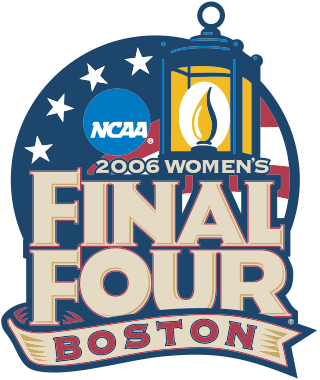
The 2006 NCAA Division I women's basketball tournament was held from March 18 to April 4, 2006, at several sites, with the championship game held in Boston. The Maryland Terrapins, coached by Brenda Frese, won their first National Championship, beating the Duke Blue Devils, coached by Gail Goestenkors, 78–75 in overtime. Laura Harper of the Terrapins was named Most Outstanding Player.
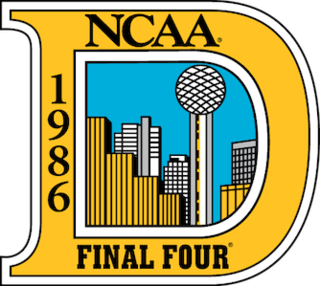
The 1986 NCAA Division I men's basketball tournament involved 64 schools playing in single-elimination play to determine the national champion of men's NCAA Division I college basketball. It began on March 13, 1986, and ended with the championship game on March 31 in Dallas, Texas. A total of 63 games were played.

The 1978 NCAA Division I basketball tournament involved 32 schools playing in single-elimination play to determine the national champion of men's NCAA Division I college basketball. It began on March 11, 1978, and ended with the championship game on March 27 in St. Louis, Missouri. A total of 32 games were played, including a national third-place game.
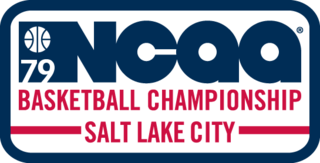
The 1979 NCAA Division I basketball tournament involved 40 schools playing in single-elimination play to determine the national champion of men's NCAA Division I college basketball. It began on March 9 and ended with the championship game on March 26 in Salt Lake City. A total of 40 games were played, including a national third-place game. This was the tournament's only edition with forty teams; the previous year's had 32, and it expanded to 48 in 1980. The 1979 Indiana State team was the last squad to reach a national title game with an undefeated record for 42 years; their achievement was finally matched by the 2021 Gonzaga Bulldogs, who reached that year's title contest against Baylor with a 31-0 record.

The 1980 NCAA Division I basketball tournament involved 48 schools playing in single-elimination play to determine the national champion of men's NCAA Division I college basketball. It began on March 6, 1980, and ended with the championship game on March 24 at Market Square Arena in Indianapolis. A total of 48 games were played, including a national third-place game.

The 1988 NCAA Division I men's basketball tournament involved 64 schools playing in single-elimination play to determine the national champion of men's NCAA Division I college basketball. The 50th annual edition of the tournament began on March 17, 1988, and ended with the championship game on April 4 returning to Kansas City for the 10th time. A total of 63 games were played.

The 2000 NCAA Division I men's basketball tournament involved 64 schools playing in single-elimination play to determine the national champion of men's NCAA Division I college basketball. It began on March 16, 2000, and ended with the championship game on April 3 in Indianapolis, Indiana at the RCA Dome. A total of 63 games were played.

The 2007 NCAA Division I women's basketball tournament began on March 17, 2007 and concluded on April 3 at Quicken Loans Arena in Cleveland, Ohio. The Final Four consisted of Tennessee, LSU, Rutgers, and North Carolina, with Tennessee defeating Rutgers 59–46 for their seventh National Title. Tennessee's Candace Parker was named the Most Outstanding Player of the tournament.
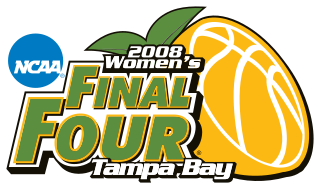
The 2008 NCAA Division I women's basketball tournament involved 64 teams playing in a single-elimination tournament to determine the 2007–08 national champion of women's NCAA Division I college basketball. It commenced on March 22, 2008, and concluded when the University of Tennessee Lady Volunteers defeated the Stanford University Cardinal 64–48 on April 8, 2008, at the St. Pete Times Forum in Tampa, Florida.
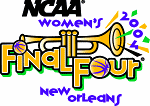
The 2004 NCAA Division I women's basketball tournament began on March 20 and concluded on April 6 when Connecticut won a third consecutive national championship, becoming only the second school in history to accomplish such a feat. The Final Four was held at the New Orleans Arena in New Orleans, Louisiana, on April 4–6 and was hosted by Tulane University. UConn, coached by Geno Auriemma, defeated archrivals Tennessee, coached by Pat Summitt, 81–67 in the championship game. UConn's Diana Taurasi was named Most Outstanding Player for the second consecutive year. The tournament was also notable as UC Santa Barbara became the first double digit seed not to lose by a double-digit margin in the Sweet 16 as they lost to UConn 63–57.

The 2009 NCAA Division I women's basketball tournament commenced 21 March 2009 and concluded 7 April 2009 when the University of Connecticut Huskies defeated the Louisville Cardinals 76–54.

The 2002 NCAA Division I women's basketball tournament concluded on March 31, 2002 when Connecticut won the national title. The Final Four was held at the Alamodome in San Antonio on March 29–31, 2002. UConn, coached by Geno Auriemma, defeated Oklahoma 82-70 in the championship game.

The 2010 NCAA Division I women's basketball tournament started Saturday, March 20, 2010, and was completed on Tuesday, April 6 of the same year with University of Connecticut Huskies defending their title from the previous year by defeating Stanford, 53–47.
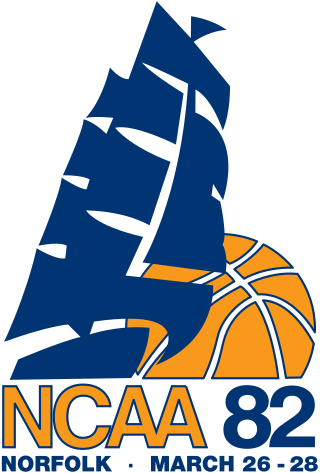
The 1982 NCAA Division I women's basketball tournament was the first Women's Basketball Tournament held under the auspices of the NCAA. From 1972 to 1982, there were national tournaments for Division I schools held under the auspices of the AIAW. The inaugural NCAA Tournament included 32 teams. Tennessee, Louisiana Tech, Cheyney State, and Maryland met in the Final Four, held at the Norfolk Scope in Norfolk, Virginia and hosted by Old Dominion University, with Louisiana Tech defeating Cheyney for the title, 76-62. Louisiana Tech's Janice Lawrence was named the Most Outstanding Player of the tournament. Her teammate Kim Mulkey went on to become the first woman to win NCAA Division I basketball titles as a player and coach, winning the 2005, 2012, 2019 titles as head coach at Baylor and the 2023 title at LSU..

The 1991 NCAA Division I women's basketball tournament began on March 13 and ended on March 31. The tournament featured 48 teams. The Final Four event was hosted by the University of New Orleans, and held at the Lakefront Arena in New Orleans. The Final Four teams consisted of Tennessee, Stanford, Connecticut, and Virginia, with Tennessee defeating Virginia 70-67 (OT) to win its third NCAA title. Virginia's Dawn Staley was named the Most Outstanding Player of the tournament.

The 2013 NCAA Division I women's basketball tournament was played from March 23 through April 9, 2013. Tennessee continued its streak of making every NCAA women's basketball tournament at 32 consecutive appearances. Kansas made the regional semifinals for the second year in a row as a double-digit seed, UConn made it into the Final Four for the sixth consecutive year, the longest such streak, and Louisville became the first team seeded lower than fourth in a region to advance to the championship game. For the first time in tournament history, the same four teams were #1 seeds as in the previous year.

The 2014 NCAA Division I women's basketball tournament was played in March and April 2014, with the Final Four played April 6–8. The Ohio Valley Conference served as the host institution. The Final Four was played at Bridgestone Arena in Nashville, Tennessee.

The 2017 NCAA Division I women's basketball tournament was played from Friday, March 17 to Sunday, April 2, 2017, with the Final Four played at the American Airlines Center in Dallas, Texas on March 31 and April 2. This was the first time that the women's Final Four was played in Dallas and the first time since 2002 that the Final Four games were played on Friday and Sunday, rather than Sunday and Tuesday. South Carolina defeated Mississippi State to win the championship.

The 2022 NCAA Division I women's basketball tournament was a single-elimination tournament of 68 teams to determine the National Collegiate Athletic Association (NCAA) Division I college basketball national champion for the 2021–22 NCAA Division I women's basketball season. The 40th edition of the tournament began on March 16, 2022, and concluded with the championship game on April 3 at Target Center in Minneapolis, where the South Carolina Gamecocks defeated the UConn Huskies 64–49 to win their second NCAA title, and handing UConn its first loss in the championship game. This tournament marked the introduction of the "First Four" round and an expansion of the field of participants from 64 teams to 68, mirroring the men's tournament since 2011.

The 2024 NCAA Division I women's basketball tournament was a 68-team single-elimination tournament to determine the National Collegiate Athletic Association (NCAA) Division I college basketball national champion for the 2023–24 NCAA Division I women's basketball season. The 42nd edition of the tournament began on March 20, 2024, and concluded with the championship game on April 7, 2024 at Rocket Mortgage FieldHouse in Cleveland, Ohio.






















